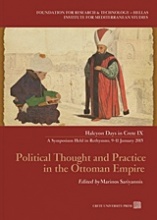Political Thought and Practice in the Ottoman Empire
Halcyon days in Crete IX - A symposium held in Rethymno, 9-11 January 2015
Ο τόμος σκοπεύει να διερευνήσει την οθωμανική πολιτική σκέψη, αναζητώντας απαντήσεις σε ερωτήματα όπως: πρότειναν οι οθωμανοί πολιτικοί στοχαστές μεταρρυθμίσεις προτού εκείνες υιοθετηθούν από τα κέντρα αποφάσεων, ή ένιωθαν ότι εξελίξεις με τις οποίες δεν συμφωνούσαν τους ξεπερνούσαν; Ποια ήταν η σχέση ιδεολογικών ρευμάτων προσανατολισμένων στη θρησκεία με μεταρρυθμίσεις παρόμοιου προσανατολισμού στο φορολογικό και το γαιοκτητικό σύστημα; Ποια ήταν η σχέση ανάμεσα στην ευρωπαϊκή (και/ή ιρανική) σκέψη και τις οθωμανικές πολιτικές εξελίξεις, μέσω μεταναστών ή εξωμοτών; Υπήρχε καινοτόμος πολιτικός στοχασμός που οδήγησε στις ριζοσπαστικές μεταρρυθμίσεις της εποχής του Τανζιμάτ; Επιπλέον, ο τόμος προσπαθεί να διερευνήσει τη σχέση των πολιτικών ιδεών με την πολιτική πράξη της εποχής τους: με άλλα λόγια, να εξετάσει τη φύση της πολιτικής εξουσίας στα διάφορα στάδια εξέλιξης της αυτοκρατορίας, τις εξελίξεις που οδήγησαν συγκεκριμένες ομάδες να προωθήσουν ειδικές μεταρρυθμίσεις, τα δίκτυα εξουσίας στο διοικητικό και το πολιτικό επίπεδο, την πρόσληψη των πολιτικών μεταρρυθμίσεων στην πρωτεύουσα και τις επαρχίες, τη συμμετοχή διαφόρων πολιτικών παραγόντων στη χάραξη κρατικής πολιτικής και τη νομιμοποίησή της, και ούτω καθεξής. Contrary to the traditional image of a stagnating, conservative state, innovation and reform seem to have been constant features of Ottoman administration throughout the empire’s long history. As the relevant treatises by Ottoman administrators and intellectuals reveal, reform and change became contested matters especially from the second half of the sixteenth century onwards: some authors felt the need for reform and advocated for it; others perceived changes as a challenge to the traditional order and suggested a return to what was considered the ‘Golden Age’ of the Empire. Eventually, in the grand narrative of Ottoman history, it is the Tanzimat which represents the climax of the process of transformation of the Empire. Even though it is often attributed to the influence (and pressure) of Western Europe, recent studies emphasise the internal dynamics of Ottoman society and administration rather than external factors, treating the developments of the seventeenth and the eighteenth century as a course towards modernity. This volume aims to explore Ottoman political thought and seeks answers to questions such as those: Did Ottoman political thinkers precede policy-makers in proposing reform, or did political writers feel surpassed by developments with which they did not agree? What was the relation of religion-oriented ideological currents with like-minded reforms in the fiscal and landholding systems? What was the relation between European (and/or Iranian) thought and Ottoman political developments? Was there innovative political thinking that led to the radical reforms of the Tanzimat era? Moreover, the volume seeks to investigate the relation of political ideas to the political praxis of their time: i.e. to examine the nature of political power in the various stages of the Empire, the developments that led particular groups to advocate specific reforms, the power networks at the administrative and political levels, the reception of political reform in Istanbul and the provinces, the participation of various political actors in state policy-making and its legitimisation, and so forth.
- ISBN978-960-524-553-5
- Ημ/νια Έκδοσης2019
- Σελίδες524
- ΔέσιμοΜαλακό εξώφυλλο
- Διαθέσιμες Γλώσσες
- Θεματολογίες Βιβλίου
- Συγγραφέας
- Επιμελητής
- Εκδότης

